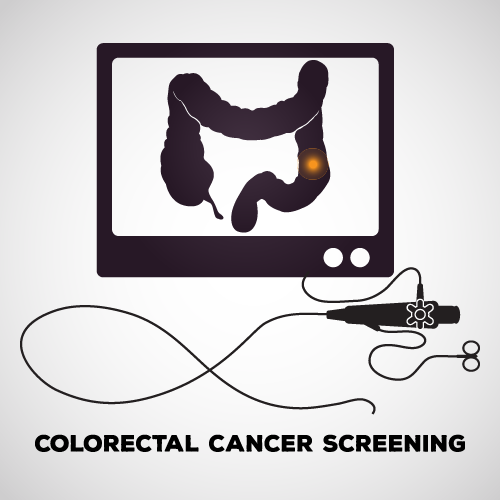Routine colorectal cancer screenings make a significant difference in early detection to improve cancer outcomes. Whether through screening awareness, the offering of innovative treatments or the development of new therapies, Rutgers Cancer Institute in partnership with RWJBarnabas Health remains a statewide resource in advancing our understanding about colorectal cancer.
Colorectal cancer (cancer of the colon and rectum) remains the third leading cause of cancer death among both men and women in the nation. According to the American Cancer Society, about 104,200 new cases of colon cancer and 45,200 new cases of rectal cancer are expected to be diagnosed in the United States this year with about 53,000 deaths from this disease. The goal of colorectal cancer awareness month in March is to help educate people about the risk of colorectal cancer and the benefits of early detection.
Colorectal cancer usually does not cause any symptoms until it is advanced and starts to spread through the body. Most colorectal cancers can be prevented through regular screening through detection and removal of polyps, so it is important to learn about recommended screening guidelines.
Types of Screening
Stool tests. Both polyps and colorectal cancers can bleed, and stool tests check for tiny amounts of blood in feces (stool) that cannot be seen visually. Currently, three types of stool tests are approved by the US Food and Drug Administration (FDA) to screen for colorectal cancer: guaiac FOBT (gFOBT); the fecal immunochemical (or immunohistochemical) test (FIT, also known as iFOBT); and multitargeted stool DNA testing (also known as FIT-DNA). With these tests, stool samples are collected by the patient using a kit, and the samples are returned to the doctor. People who have a positive finding with these tests are advised to have a colonoscopy.

Sigmoidoscopy. In this test, the rectum and sigmoid colon are examined using a sigmoidoscope, a flexible lighted tube with a lens for viewing and a tool for removing tissue. This instrument is inserted through the anus into the rectum and sigmoid colon as air is pumped into the colon to expand it so the doctor can see the colon lining more clearly. During sigmoidoscopy, abnormal growths in the rectum and sigmoid colon can be removed for analysis (biopsied). The lower colon must be cleared of stool before sigmoidoscopy, but the preparation is not very extensive. People are usually not sedated for this test.
Colonoscopy. In this test, the rectum and entire colon are examined using a colonoscope, a flexible lighted tube with a lens for viewing and a tool for removing tissue. Like the shorter sigmoidoscope, the colonoscope is inserted through the anus into the rectum and the colon as air is pumped into the colon to expand it so the doctor can see the colon lining more clearly. During colonoscopy, any abnormal growths in the entire colon and the rectum can be removed. Preparation for colonoscopy requires a thorough cleansing of the entire colon before the test. Most patients receive some form of sedation during the test.
Virtual colonoscopy, also called computed tomographic (CT) colonography, is a screening method that uses special x-ray equipment (a CT scanner) to produce a series of pictures of the colon and the rectum from outside the body. A computer then assembles these pictures into detailed images that can show polyps and other abnormalities. As with standard colonoscopy, a thorough cleansing of the colon is necessary before this test. If polyps or other abnormal growths are found during a virtual colonoscopy, a standard colonoscopy must usually be performed to remove them.
Information about types of Colorectal cancer screening originally published by the National Cancer Institute.
Additional Learning
 45 is the New 50 for Colorectal Cancer Screening
45 is the New 50 for Colorectal Cancer Screening
The U.S. Preventative Services Task Force (USPSTF) recommends that people begin colorectal cancer screening at age 45, rather than 50, which was the previous recommendation. The updated guidelines consider the benefits of early detection and treatment for adults with no personal history or increased risk of the disease. Read more
 Why is Colorectal Cancer on the Rise in Younger People?
Why is Colorectal Cancer on the Rise in Younger People?
In recent years, colorectal cancer diagnoses and deaths among individuals younger than 50 years of age have increased, which has raised many questions about who should be screened for colorectal cancer and has even prompted the United States Preventative Task Force (USPTF) and American Cancer Society to update their screening recommendations. Read more
 Exploring Racial and Ethnic Disparities in Colorectal Cancer Screening
Exploring Racial and Ethnic Disparities in Colorectal Cancer Screening
Over the last decade, health systems have put a stronger emphasis on making preventive care accessible and equitable, which has contributed to a reduction in colorectal cancer incidence and mortality for the general population. However, significant disparities persist among some racial and ethnic groups. Read more
 Finding Resources for Colorectal Cancer Screening
Finding Resources for Colorectal Cancer Screening
By raising awareness about colorectal cancer and minority health disparities, communities, organizations and health professionals can take action toward prevention and early detection. Read more
 ScreenNJ
ScreenNJ
ScreenNJ was developed under the leadership of Rutgers Cancer Institute in partnership with the New Jersey Department of Health. The initiative is a collaboration of organizations across the state committed to reducing cancer incidence and mortality through outcomes-oriented, evidence-based cancer prevention and screening programs. The public can utilize this resource to find local colorectal (as well as lung) cancer screening programs and information about the types of testing and benefits. Learn more
 Colorectal Cancer: Advancing Awareness
Colorectal Cancer: Advancing Awareness
Along with maintaining a balanced diet and engaging in regular physical activity, screening for colorectal cancer is important. Colorectal cancer usually does not cause any symptoms until it is advanced and starts to spread through the body. If diagnosed at a later stage, the disease can be more challenging to treat and cure. If detected early, colorectal cancer can be treated more effectively. Read more
 Colorectal Cancer Resource Center
Colorectal Cancer Resource Center
Colorectal cancer is the third most common type of cancer in both men and women and is the second leading cause of cancer death after lung cancer. Many colorectal cancers can be prevented through regular screening. Screening can find precancerous polyps—abnormal growths in the colon or rectum—so that they can be removed before they turn into cancer. Read more

